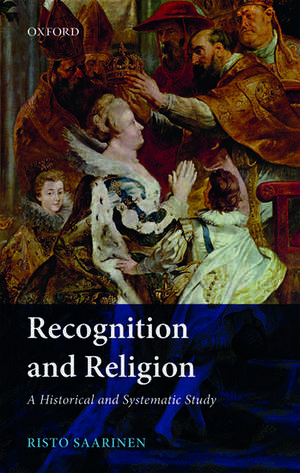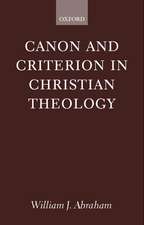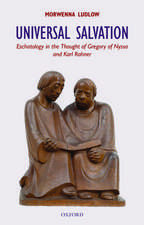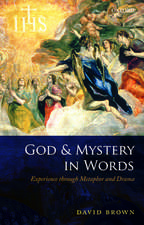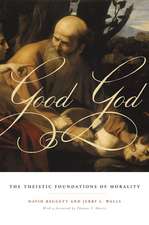Recognition and Religion: A Historical and Systematic Study
Autor Risto Saarinenen Limba Engleză Hardback – 27 oct 2016
Preț: 562.07 lei
Preț vechi: 806.95 lei
-30% Nou
Puncte Express: 843
Preț estimativ în valută:
107.55€ • 112.58$ • 89.52£
107.55€ • 112.58$ • 89.52£
Carte tipărită la comandă
Livrare economică 19-25 martie
Preluare comenzi: 021 569.72.76
Specificații
ISBN-13: 9780198791966
ISBN-10: 0198791968
Pagini: 282
Dimensiuni: 137 x 223 x 20 mm
Greutate: 0.45 kg
Editura: OUP OXFORD
Colecția OUP Oxford
Locul publicării:Oxford, United Kingdom
ISBN-10: 0198791968
Pagini: 282
Dimensiuni: 137 x 223 x 20 mm
Greutate: 0.45 kg
Editura: OUP OXFORD
Colecția OUP Oxford
Locul publicării:Oxford, United Kingdom
Recenzii
an exercise in analysis, discrimination and interpretation is called for and this is what Professor Risto Saarinen has provided in a very useful study, which has particular relevance to ecumenical theology and dialogue. He draws on recent work in the social sciences, the etymology of words for recognition in several languages, the history of the idea in philosophy and theology and on ecclesiological texts to provide a survey and analysis of both language use and theological thinking in this area. To take the language of recognition more seriously, with the help of this book, will guide our theology into a more personalist and relational mode.
Saarinen fills a much-needed lacuna by recovering the contributions of religion (in this case, Christianity) to recognition history...[A]s a religious scholar who also dabbles into the study of recognition ideology, I offer hearty congratulations to a senior colleague for producing an unprecedented volume that adds to scholarship on recognition. Having perused innumerable monographs on contemporary recognitional development in philosophy and political theory, I can say that Saarinen's reading of recognitional themes in the religious tradition of Christianity could generate new trajectories in contemporary theorizing of recognition.
Saarinen's new book is written for academic specialists in historical and systematic Christian theology; it may prompt interest in recognition among scholars of other religions, and of religious pluralism, as well ... the book's central claim -- that a theological mode of recognition exists independently of Hegel and that post-Hegelian philosophy is indebted to that tradition -- is a bold, very well-defended, and, I think, eminently defensible one ... Saarinen is very good at showing patterns of continuity and discontinuity in the treatment of religious recognition. His carefully structured prose, which is notably unadorned with stylistic flourishes, clearly shows significant variations among accounts of religious recognition.
Saarinen fills a much-needed lacuna by recovering the contributions of religion (in this case, Christianity) to recognition history...[A]s a religious scholar who also dabbles into the study of recognition ideology, I offer hearty congratulations to a senior colleague for producing an unprecedented volume that adds to scholarship on recognition. Having perused innumerable monographs on contemporary recognitional development in philosophy and political theory, I can say that Saarinen's reading of recognitional themes in the religious tradition of Christianity could generate new trajectories in contemporary theorizing of recognition.
Saarinen's new book is written for academic specialists in historical and systematic Christian theology; it may prompt interest in recognition among scholars of other religions, and of religious pluralism, as well ... the book's central claim -- that a theological mode of recognition exists independently of Hegel and that post-Hegelian philosophy is indebted to that tradition -- is a bold, very well-defended, and, I think, eminently defensible one ... Saarinen is very good at showing patterns of continuity and discontinuity in the treatment of religious recognition. His carefully structured prose, which is notably unadorned with stylistic flourishes, clearly shows significant variations among accounts of religious recognition.
Notă biografică
Risto Saarinen is Professor of Ecumenics and Chair of Ecumenics at the University of Helsinki. Saarinen has published extensively in the fields of medieval and early modern philosophy and theology as well as contemporary ecumenism. He is the author of Weakness of Will in Renaissance and Reformation Thought (OUP, 2011).
